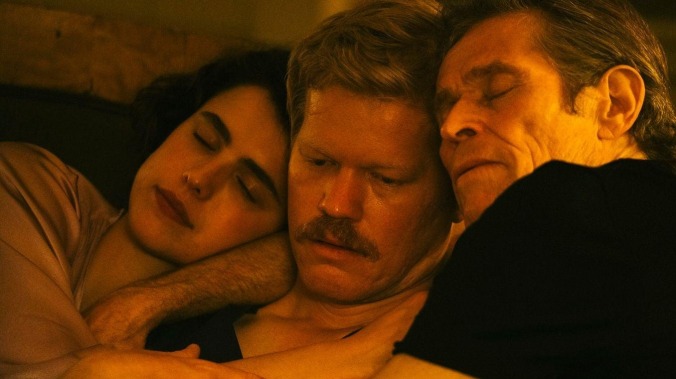Kinds Of Kindness review: Peak Yorgos Lanthimos
The Greek freak is back with the kind of movie it feels perverse to say you “enjoy”

There was a subversive thrill to the original title of Yorgos Lanthimos’ new anthology movie, the “triptych fable” Kinds Of Kindness. Calling a movie “And” would have broken pretty much every commonsense SEO and marketing rule; the very idea of it felt like a cheeky two-fingers up to studio execs and search engines everywhere (even if it would have posed a bit of a nightmare for anyone trying to find showtimes).
But watching Kinds Of Kindness—which sees Lanthimos reunite with Efthymis Filippou, his writing partner on nearly everything besides The Favourite and Poor Things—the wisdom of its retitling becomes clear, and the rebellious appeal of the original name is quickly forgotten. If you’ve ever seen a Lanthimos film, you’ll recognize an obvious ironic undertone to this new title, as compassion and selflessness are routinely absent from his sterile worlds. But more than Lanthimos and Filippou’s other collaborations, Kinds Of Kindness is also an intensely icy immersion into the duo’s psychological dystopias—where identities are surreally warped and emotion disconcertingly cold—and so the title’s emphasis on human connection feels perfectly fitting.
Kinds Of Kindness’ three chapters are most obviously linked by their titles: “The Death of RMF,” “RMF is Flying,” and “RMF Eats A Sandwich,” which all reference a silent and otherwise anonymous man who is closer to being a plot axle than an actual character. Each episode also shares a tight troupe of actors: Jesse Plemons, Emma Stone, Willem Dafoe, Margaret Qualley, Hong Chau, Mamoudou Athie, and Joe Alwyn (with Hunter Schafer appearing only in the concluding chapter).
But at their core, what most unites the movie’s trio of stories is their common exploration of choice and control, subjugation and submission. The movie is not unlike a sicko’s take on The Five Love Languages (that Internet-famous self-help taxonomy of affection)—only here, voluntary “acts of service” are reimagined as sacrifices made to satisfy the sadistic demands of emotional tyrants.
In one story, for example, Plemons plays Robert, a meek businessman whose every life decision in adulthood has been decided for him by his boss Raymond (played with steely perfection by Dafoe). When Robert finally balks at one particularly shocking instruction, he’s coldly shut out of his own life, and makes desperate, unhinged attempts to regain Raymond’s mercurial favor. In another, the script is flipped, and it’s Plemons who demands psychopathic tests of devotion—this time from his marine biologist wife (Stone), who returns from being lost at sea seeming like an impostor in the eyes of Plemons’ suspicious Daniel.
Though these two installments pose their own queasy challenges to audiences—thanks to grisly sights and emotional brutality—there is a cumulative quality to the film’s displays of cruelty. In Kinds Of Kindness’ last chapter, all this affection-withholding and emotional dictatorship culminates in its logical endpoint: “RMF Eats A Sandwich” revolves around a cult to which Stone’s Emily belongs, which is headed up by a deceptively serene Dafoe and Chau. In this episode, the absurdist humor that lightened the previous two stories curdles into bitter irony, the gore grows walkout-inducing (particularly in one scene featuring Stone and a dog), and the claustrophobia reaches near-suffocating heights. As much as the rest of Kinds Of Kindness involves a form of psychological BDSM playing out on screen, by this point the experience of watching the movie might also feel like a punishing act of submission itself. In fact, by the time we get to this deeply ugly finale, even confirmed Lanthimos-heads might hear the verbalization of their own thoughts in the soundtrack’s use of a choir that appears to belt out nothing but a dread-soaked, operatic “NO.”
This ramping-up of darkness from episode to episode is largely what justifies Kinds Of Kindness’ triptych structure. It never feels like these evenly-timed stories would fare better in isolation; they build upon and complicate one another, gelling into something haunting that fits the touted “fable” description. By stripping away the need to lay out a single overarching plot, opting instead for three thematically linked one-offs, Lanthimos and Filippou offer audiences the most unblinking gaze into their funhouse-mirror view of relationships as they have yet. What’s more, the seesawing of dynamics between the actors’ roles across each chapter gives the whole picture a pleasing completeness—all the performances fill each other out, with Stone’s centrality in the most intense final chapter balancing Plemons’ show-stealing in the first two. The polish on that effect are the eerie echoes that reverberate across the movie, including body-licking, curiously shared initials, and prescient dreams.
At first glance, Kinds Of Kindness may seem to lack some of the surface elements most associated with Lanthimos’ work: For example, cinematographer Robbie Ryan largely retires his fish-eye lens here, after putting it in heavy rotation on Poor Things. But in deeper ways, the movie feels like peak Lanthimos. After a few years of collaborating with other writers on more accessible films, the director reunites with Filippou to dig their heels in on their idiosyncratic style, never bolder or more divisive than it is here. Following Poor Things’ brief foray into happy endings, Kinds Of Kindness sees Lanthimos return to the kind of movie it feels perverse to say you “enjoy.” In short: The Greek freak is back.